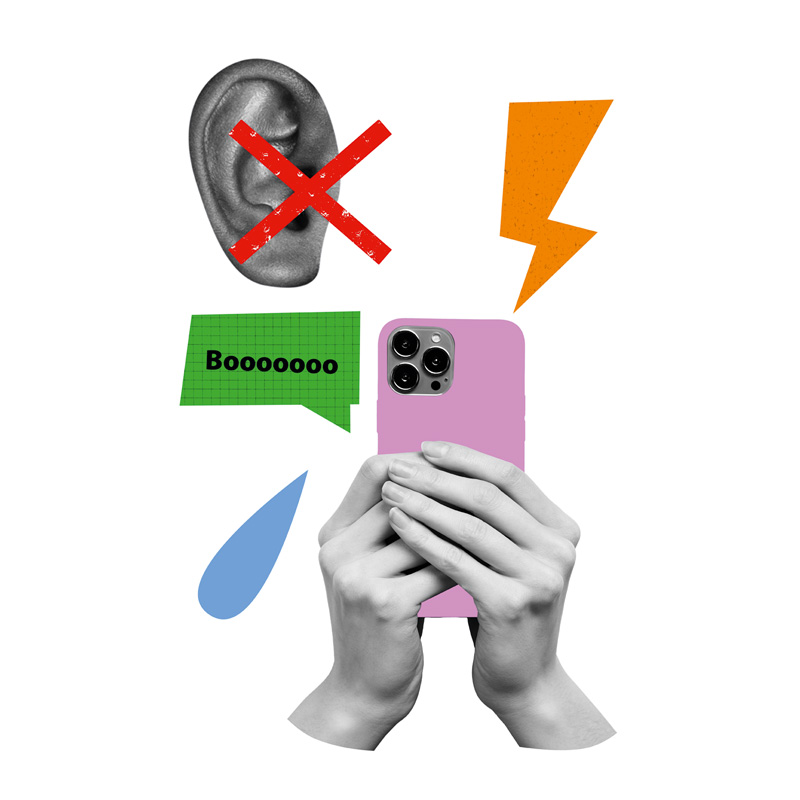Bullying is no longer confined to the playground. It affects classrooms, digital spaces, and even homes, shaping how students feel about themselves and their communities. Recent studies show that nearly one in three school-age children and teenagers in Greece experiences some form of bullying, yet many feel unequipped to respond or prevent it.
This special feature explores how bullying can be addressed through culture, connection, and awareness—by fostering empathy, teaching respect, and empowering students to act. Tackling bullying is not just about responding to incidents; it is about building environments where every child feels safe, valued, and supported every day.

Beyond Policy: The Imperative to Build a Culture of Connection, Respect, and Genuine Belonging
By Maria Akritidou, Head of Wellbeing and Psychological Services, Anatolia College
Bullying is not just something that happens out there. It happens in classrooms, on playgrounds, and increasingly in digital spaces where students spend much of their time. A recent nationwide survey showed that almost one in three Greek students has experienced some form of bullying, while many feel their school does little to teach them how not to bully.
Tackling bullying means shaping a school environment where respect is taught, modeled, and lived
At Anatolia College, we have learned that change is not achieved through policies alone but through culture: how we talk to one another, how we listen, and how we act in everyday moments that shape school life. This is a journey that requires constant reflection, effort, and awareness.
Building a Culture of Connection
Wellbeing cannot be reduced to a one-off initiative. It must be woven into the fabric of school life. Our anti-bullying policy provides a framework, but its value depends on how students experience it—through restorative conversations, classroom reflections, and opportunities to repair relationships rather than face punishment.
One student recently wrote to us: “I enjoy it a lot when the topic of bullying is discussed. It helps me understand how to deal with it when in danger or under pressure.” This is what we hope to achieve: equipping students with tools, not just rules. Still, we know that not every student will feel equally supported, and that motivates us to keep improving.
The Role of Student Voices
Some of the most meaningful work comes from students themselves. In our Primary Division, the Study Buddies program encourages younger children to look out for one another by inviting a classmate into a game, helping with homework, or simply noticing when someone is left out. These small, everyday gestures create habits of inclusion that ripple across the playground.
In Secondary School, Wellbeing Ambassadors play a different but equally important role. They are trained to notice early signs of exclusion, digital harm, or conflict. Their creativity has often reshaped how we address bullying, though we continue to explore how best to support them in this demanding role. Recently, our Ambassadors led a project called “I Choose Respect.” Students wrote what respect meant to them and transformed those reflections into a mural displayed in a central school space. The mural became a reminder that respect is not abstract but built day by day.
Concrete Steps Forward
Our efforts extend beyond workshops and murals. Regular wellbeing questionnaires help monitor how safe and connected students feel, giving us data to guide improvements. Teachers receive ongoing training on classroom dynamics, while parents join informative sessions to ensure home-school cooperation. We also partner with regional networks of psychologists and educational experts, exchanging knowledge and strategies that strengthen our collective response.
At Anatolia College, tackling bullying means more than reacting to incidents. It means shaping a school environment where respect is taught, modeled, and lived. We are proud of the initiatives we have built, but we remain aware of challenges ahead. Our hope is that by continuing to learn from students, teachers, and families, we can move beyond the playground and closer to a culture of genuine belonging.

The New Frontier: Standing Up to Cyberbullying Through Policy, Empathy, and Responsible Digital Citizenship
By Roxanne Giampapa, Head of School, Pinewood American International School
In the digital age, the reach of bullying extends far beyond playgrounds; it follows students into their homes to disrupt well beyond the school day. Therefore, addressing cyberbullying requires a bold, proactive stance embedded in policy, education, and shared responsibility.
Robust Child Protection and Safeguarding Measures
A foundational step is the establishment of a clear and comprehensive child protection and safeguarding policy manual. This is not only a legal necessity; it also communicates our fundamental promise to keep students safe. These policies outline procedures for reporting concerns, responding to incidents, and supporting victims. Importantly, they are living documents, regularly reviewed and updated to reflect emerging threats in the modern landscape. The best resource for this work is ICMEC, the International Center for Missing and Exploited Children.
Every child deserves to grow up in a world where their dignity is safeguarded
Digital Literacy Meets Empathy
We also embed digital citizenship and social-emotional learning (SEL) across all grade levels. Our programs teach students how to use technology responsibly, recognize harmful behavior, and support one another with empathy.
The New Frontier: Deepfakes
Cyberbullying has evolved, and nowhere is that more evident than in the rise of deepfakes. Artificial intelligence now enables anyone to create disturbingly realistic images or videos—often shared maliciously. Reports show that young people, especially girls, are disproportionately targeted with AI-generated intimate images, sometimes resulting in trauma or suicide. Studies confirm that deepfakes are becoming a new vector for cyberbullying that schools must confront.
To counter this, Pinewood has updated our safeguarding policy to explicitly include deepfake technology. We treat the creation or distribution of non-consensual deepfake material with the same severity as traditional forms of bullying. Staff and students alike learn that reaching out—whether to report hurtful content or to support peers—matters.
A Shared Vision for Digital Dignity
Ultimately, addressing cyberbullying requires both prevention and protection. We advocate for every school to establish child protection and safeguarding frameworks, but we must go further.
The rise of deepfakes reminds us that AI technology is not neutral. It reflects the values of the hands and minds that wield it. A tool that can empower creativity and innovation can just as easily be twisted into an instrument of humiliation or harm. When a young person sees their image misused or their identity stolen by AI, the violation is not virtual—it is profoundly human. If schools are to prepare students for the future, then that future must be built on ethical courage.
The greatest challenge of AI is not simply how to use it but how to ensure it is used responsibly. By teaching students empathy, discernment, and accountability, we can help them become not only digital citizens but also digital stewards who insist that technology serve humanity, not exploit it.
Every child deserves to grow up in a world where their dignity is safeguarded, both in classrooms and across the networks that now shape their lives. The work begins with us—all of us—today.


Educating Hearts and Minds: A Holistic and Proactive Approach to Empower Students and Stop Bullying
By Iliana Lazana, Senior Vice President of Administration and Pierce, The American College of Greece and Maximilianos Vasileiou, Associate Vice President - Pierce Administration, The American College of Greece
Grounded in its commitment to a safe, inclusive, and respectful learning environment for all students, Pierce – The American College of Greece takes a comprehensive, student-centered approach to preventing and addressing bullying. The school’s strategy combines clearly defined policies, proactive education, and a strong support system to promote empathy, accountability, and emotional wellbeing.
Education and raising awareness are central to building a culture of respect and inclusion
At the core of the school’s anti-bullying framework is a formal anti-bullying policy, which defines bullying in all its forms—physical, verbal, social, and cyber—and outlines procedures for prevention, intervention, and resolution. This policy emphasizes zero tolerance for bullying, confidentiality for those who report incidents, and a fair investigation process. Responses to bullying prioritize education and behavior change over punishment, supporting a restorative justice model.
Preventive efforts are built into the curriculum through peer mediation programs that are tailored to each developmental stage. These programs teach students essential skills such as empathy, emotional regulation, communication, and peaceful conflict resolution. By nurturing these competencies early, the school helps students manage interpersonal issues constructively and reduces the likelihood of bullying behaviors.
A dedicated Student Services team—including deans, counselors and psychologists—provides critical support for students involved in bullying situations. This includes counseling for victims and guidance or behavior coaching for those displaying bullying behaviors. The team also work with families and teachers to develop individualized support plans, ensuring a consistent and coordinated approach.
Education and raising awareness are central to building a culture of respect and inclusion. Pierce organizes festivals, workshops, awareness campaigns, and assemblies for students, staff, and parents throughout the year. These initiatives focus on key themes such as digital citizenship and inclusion. Special events, such as Respect Day, help maintain the conversation and reinforce shared values across the school community.
Student leadership plays a vital role in shaping a positive school climate. Through student councils and initiatives such as the Anti-Bullying Week activities, students are empowered to take responsibility for promoting respectful behavior. These student-led efforts create a culture of mutual support and help all students feel safe and seen.
All of these efforts are part of Pierce’s mission and the profile of a Pierce Learner, which both instill values such as integrity, compassion, and responsibility. From classroom interactions to extracurricular activities, students are consistently encouraged to act with respect and care for others.
In summary, Pierce’s approach to bullying is holistic and proactive, combining policy, education, emotional support, and community engagement. It seeks not only to stop bullying when it occurs, but also to create a school environment in which such behaviors are less likely to arise in the first place. By educating both hearts and minds, Pierce empowers students to build a culture where every member of the community can feel safe, valued, and respected.

Campaigning for Change: Working Together to Raise Awareness, Train Educators, and Empower Students
By Dr. Lindy Sannie McMullin, Associate Professor and Director of the Undergraduate and Graduate Psychology Programs, Hellenic American University
During Mila Tora (“Speak Now”), the nationwide school awareness campaign on the phenomenon of school violence and bullying, findings of a survey carried out in Greece in 2022-2023 showed that 32.4% of children in the country experience some form of bullying.
Educational organizations need to empower students as advocates for respect
Measures to help children, families, and teachers are essential in tackling this growing problem through policy, prevention, and culture-building perspectives, amongst others. However, where must the focus lie? Certainly, it is apparent that raising awareness is of utmost importance. In a changing world, diversity must be embraced and values redefined in an education system that recognizes diversity, inclusion, and equity, where everyone feels welcome, respected, and valued for their unique strengths and perspectives. Together, these principles foster a supportive and accessible environment where all individuals can thrive in a holistic system of growth. Without holism, there will always be a lack of awareness as to the dignity of being human and the need for diversity and inclusion. Each educational organization needs to empower students as advocates for respect, through education. Cyberbullying needs to be addressed both in and beyond the classroom, thus building a positive school climate through collaboration. Instead of focusing on consumer advertising, campaigns are essential that address the social issues that are being faced.
Working with families, counselors, or community partners will inevitably raise awareness; however, there must be a generalized campaign that is uniform to every organization. At Hellenic American University, students are eager to learn from others and can embrace diversity, always focused on bettering themselves. They are aware that self-development is essential when needing to address dysfunctional tendencies toward projecting inner issues onto the outside world. Those who bully others are usually in need of support, and this is why the training of educationalists needs to include psychology as well as education.
Lessons need to be learned from recent incidents, and new initiatives need to be embraced, with psychologists specialized in bullying in each school or with an online service that caters for this. Regular training of teachers about bullying is essential so that each class is given a code of conduct when they begin the academic year and different programs designed for different age groups that bring awareness to children, inviting them to further explore why they are triggered by situations and how to address these triggers, rather than lashing out.
Research can also be carried out that is focused on awareness campaigns so that this becomes a joint effort in which everyone is included in making the necessary changes to alleviate the problem.






